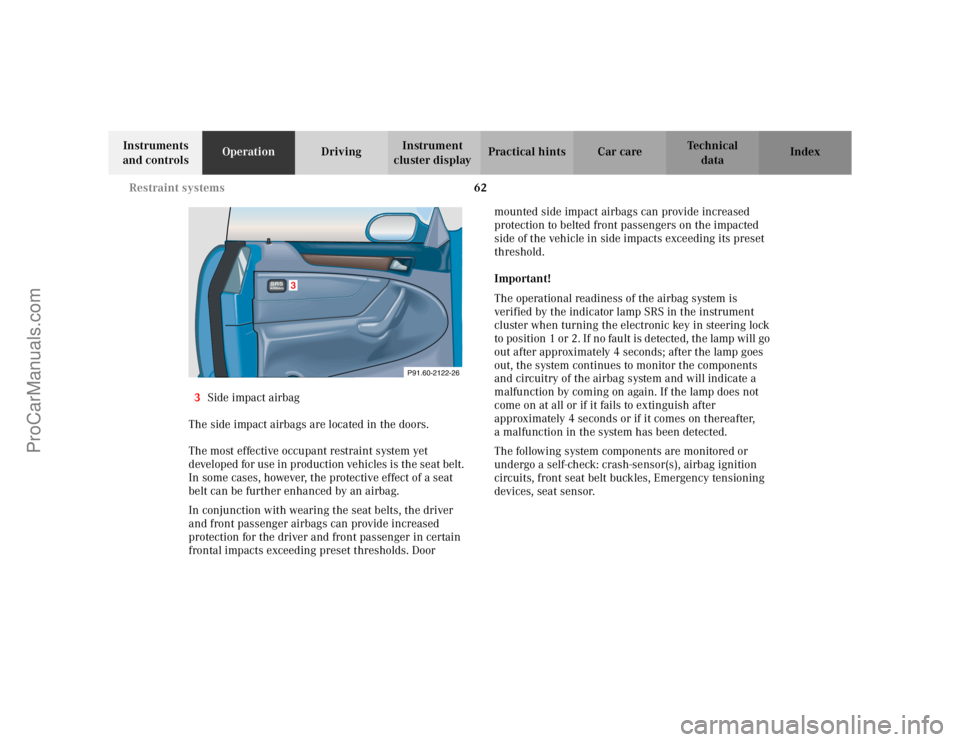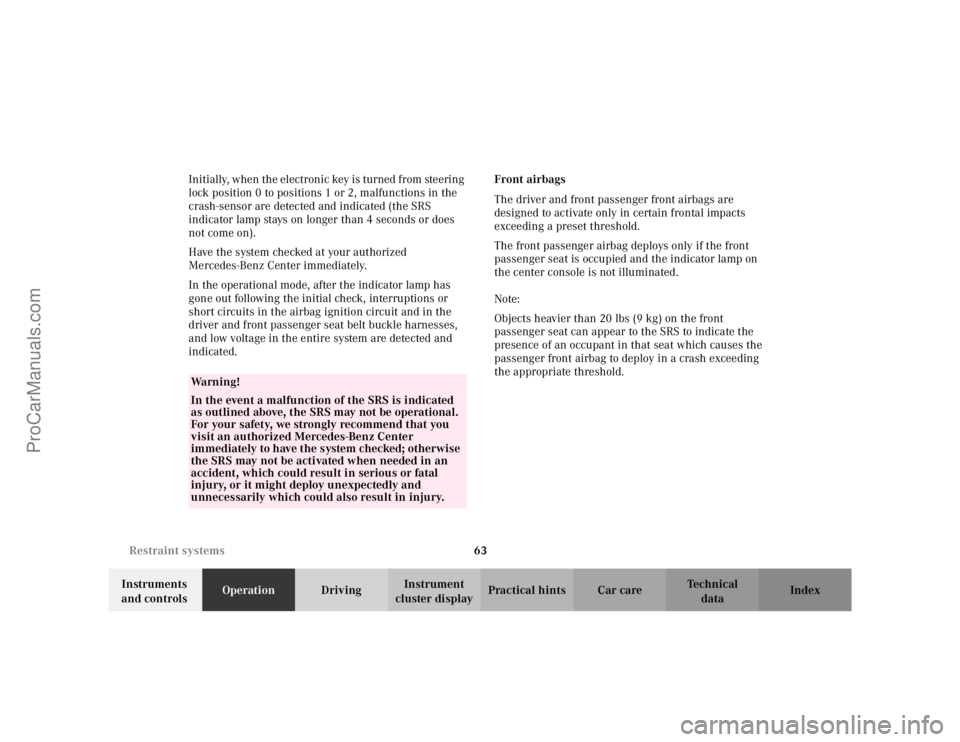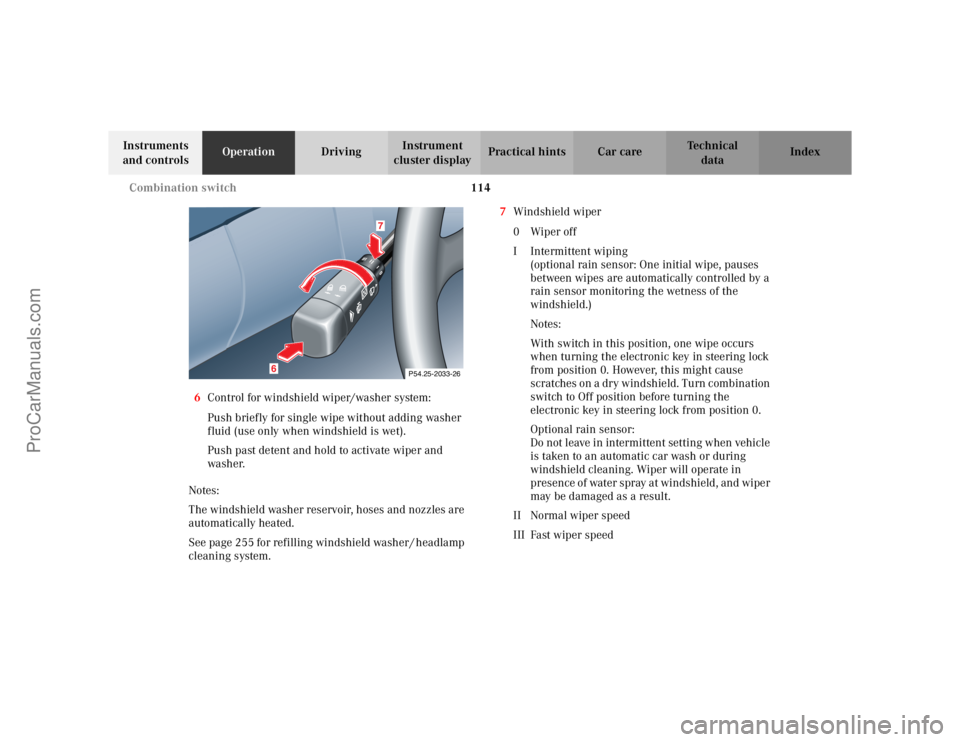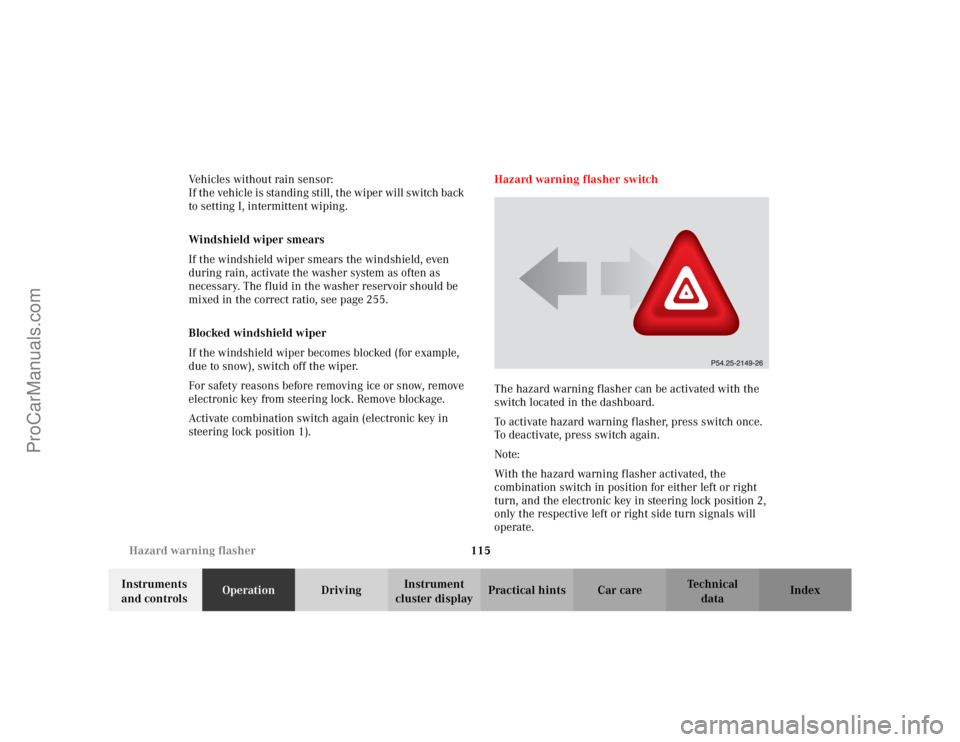2002 MERCEDES-BENZ CLK-CLASS sensor
[x] Cancel search: sensorPage 6 of 341

3 ContentsParking brake .................................200
Driving instructions ...................... 201
Drive sensibly – save fuel ......... 201
Drinking and driving ................. 201
Pedals ........................................... 201
Power assistance ........................202
Brakes ..........................................202
Driving off ...................................203
Parking ........................................204
Tires .............................................204
Snow chains ................................207
Winter driving instructions ......207
Standing water ...........................209
Passenger compartment ...........209
Traveling abroad ........................209
Cruise control ................................. 210
Brake assist system (BAS) ............ 212
Antilock brake system (ABS) ....... 214
Electronic stability program
(ESP) ........................................... 216
What you should know at the gas
station .........................................220
Check regularly and before a long
trip ...............................................222
Instrument cluster displayMalfunction and indicator lamps in
the instrument cluster ............. 224
On-board diagnostic system Check
engine malfunction indicator
lamp ............................................. 224
Brake warning lamp .................. 225
Supplemental restraint system
(SRS) indicator lamp ................. 226
Fuel reserve and fuel cap
placement warning ................... 226
Electronic stability program (ESP)
— warning lamp .......................... 227
BAS/ESP malfunction indicator
lamp ............................................. 227
ABS malfunction indicator
lamp ............................................. 227
Telescoping steering column –
indicator lamp ............................ 228
Seat belt warning lamp ............. 228
Malfunction and indicator lamps in
the center console .................... 228
AIRBAG OFF indicator lamp .... 228
Roll bar warning lamp .............. 229Malfunction and warning messages
in the multifunction display ...230
DISPLAY DEFECTIVE (engine
control unit) ................................ 231
DISPLAY DEFECTIVE (several
systems) ....................................... 231
BATTERY/ALTERNATOR ...........232
ABS-SYSTEM ...............................233
BRAKE ASSIST ...........................233
BRAKE LINING WEAR ..............234
BRAKE FLUID .............................234
PARKING BRAKE .......................235
ENGINE FAN ...............................235
COOLANT (coolant level) ..........236
COOLANT TEMP. (coolant
temperature) ...............................237
LIGHTING SYSTEM ....................238
LIGHT SENSOR ...........................239
STEER. WHEEL ADJUST. ...........239
ENGINE OIL LEVEL ...................240
ELEC. STABIL. PROG. (Electronic
stability program) ...................... 241
REMOVE KEY ............................. 241
WASHER FLUID .........................242
ProCarManuals.com
Page 65 of 341

62 Restraint systems
Te ch n i c a l
data Instruments
and controlsOperationDrivingInstrument
cluster displayPractical hints Car care Index
3Side impact airbag
The side impact airbags are located in the doors.
The most effective occupant restraint system yet
developed for use in production vehicles is the seat belt.
In some cases, however, the protective effect of a seat
belt can be further enhanced by an airbag.
In conjunction with wearing the seat belts, the driver
and front passenger airbags can provide increased
protection for the driver and front passenger in certain
frontal impacts exceeding preset thresholds. Door mounted side impact airbags can provide increased
protection to belted front passengers on the impacted
side of the vehicle in side impacts exceeding its preset
threshold.
Important!
The operational readiness of the airbag system is
verified by the indicator lamp SRS in the instrument
cluster when turning the electronic key in steering lock
to position 1 or 2. If no fault is detected, the lamp will go
out after approximately 4 seconds; after the lamp goes
out, the system continues to monitor the components
and circuitry of the airbag system and will indicate a
malfunction by coming on again. If the lamp does not
come on at all or if it fails to extinguish after
approximately 4 seconds or if it comes on thereafter,
a malfunction in the system has been detected.
The following system components are monitored or
undergo a self-check: crash-sensor(s), airbag ignition
circuits, front seat belt buckles, Emergency tensioning
devices, seat sensor.
3
P91.60-2122-26
ProCarManuals.com
Page 66 of 341

63 Restraint systems
Te ch n i c a l
data Instruments
and controlsOperationDrivingInstrument
cluster displayPractical hints Car care Index Initially, when the electronic key is turned from steering
lock position 0 to positions 1 or 2, malfunctions in the
crash-sensor are detected and indicated (the SRS
indicator lamp stays on longer than 4 seconds or does
not come on).
Have the system checked at your authorized
Mercedes-Benz Center immediately.
In the operational mode, after the indicator lamp has
gone out following the initial check, interruptions or
short circuits in the airbag ignition circuit and in the
driver and front passenger seat belt buckle harnesses,
and low voltage in the entire system are detected and
indicated.Front airbags
The driver and front passenger front airbags are
designed to activate only in certain frontal impacts
exceeding a preset threshold.
The front passenger airbag deploys only if the front
passenger seat is occupied and the indicator lamp on
the center console is not illuminated.
Note:
Objects heavier than 20 lbs (9 kg) on the front
passenger seat can appear to the SRS to indicate the
presence of an occupant in that seat which causes the
passenger front airbag to deploy in a crash exceeding
the appropriate threshold.
Wa r n i n g !
In the event a malfunction of the SRS is indicated
as outlined above, the SRS may not be operational.
For your safety, we strongly recommend that you
visit an authorized Mercedes-Benz Center
immediately to have the system checked; otherwise
the SRS may not be activated when needed in an
accident, which could result in serious or fatal
injury, or it might deploy unexpectedly and
unnecessarily which could also result in injury.
ProCarManuals.com
Page 77 of 341

74 Rear view mirrors
Te ch n i c a l
data Instruments
and controlsOperationDrivingInstrument
cluster displayPractical hints Car care Index
Inside rear view mirror
Manually adjust the inside mirror.
Use your inside mirror to determine the size and
distance of objects seen in the passenger side convex
mirror.
Antiglare night position
With the electronic key in steering lock position 2, the
mirror reflection brightness responds to changes in
light sensitivity.
With gear selector lever in position “R”, or with the
interior lamp switched on, the mirror brightness does
not respond to changes in light sensitivity.Note:
The automatic antiglare function does not react, if
incoming light is not aimed directly at sensors in the
inside rear view mirror.
The automatic antiglare function will not react for
example, if the wind screen is installed.
Wa r n i n g !
In the case of an accident liquid electrolyte may
escape the mirror housing when the mirror glass
breaks.Electrolyte has an irritating effect. Do not allow the
liquid to come into contact with eyes, skin,
clothing, or respiratory system. In cases it does,
immediately flush affected area with water, and
seek medical help if necessary.
ProCarManuals.com
Page 85 of 341

82 Instrument cluster
Te ch n i c a l
data Instruments
and controlsOperationDrivingInstrument
cluster displayPractical hints Car care Index
Coolant temperature gauge (3)
During severe operating conditions and stop-and-go city
traffic, the coolant temperature may rise close to the red
marking.
The engine should not be operated with the coolant
temperature in the red zone. Doing so may cause
serious engine damage which is not covered by the
Mercedes-Benz Limited Warranty.Outside temperature indicator (5)
The temperature sensor is located in the front bumper
area. Due to its location, the sensor can be affected by
road or engine heat during idling or slow driving. This
means that the accuracy of the displayed temperature
can only be verified by comparison to a thermometer
placed next to the sensor, not by comparison to external
displays (e.g. bank signs etc.).
Adaptation to ambient temperature takes place in steps
and depends on the prevailing driving conditions (stop-
and-go or moderate, constant driving) and amount of
temperature change.
Wa r n i n g !
• Driving when your engine is badly overheated
can cause some fluids which may have leaked
into the engine compartment to catch fire. You
could be seriously burned.• Steam from an overheated engine can cause
serious burns and can occur just by opening
the engine hood. Stay away from the engine if
you see or hear steam coming from it.Turn off the engine, get out of the vehicle and do
not stand near the vehicle until it cools down.
Wa r n i n g !
The outside temperature indicator is not designed
to serve as an Ice-Warning Device and is therefore
unsuitable for that purpose. Indicated
temperatures just above the freezing point do not
guarantee that the road surface is free of ice.
ProCarManuals.com
Page 117 of 341

114 Combination switch
Te ch n i c a l
data Instruments
and controlsOperationDrivingInstrument
cluster displayPractical hints Car care Index
6Control for windshield wiper/washer system:
Push briefly for single wipe without adding washer
fluid (use only when windshield is wet).
Push past detent and hold to activate wiper and
washer.
Notes:
The windshield washer reservoir, hoses and nozzles are
automatically heated.
See page 255 for refilling windshield washer / headlamp
cleaning system.7Windshield wiper
0Wiper off
I Intermittent wiping
(optional rain sensor: One initial wipe, pauses
between wipes are automatically controlled by a
rain sensor monitoring the wetness of the
windshield.)
Notes:
With switch in this position, one wipe occurs
when turning the electronic key in steering lock
from position 0. However, this might cause
scratches on a dry windshield. Turn combination
switch to Off position before turning the
electronic key in steering lock from position 0.
Optional rain sensor:
Do not leave in intermittent setting when vehicle
is taken to an automatic car wash or during
windshield cleaning. Wiper will operate in
presence of water spray at windshield, and wiper
may be damaged as a result.
II Normal wiper speed
III Fast wiper speed
P54.25-2033-26
6
7
ProCarManuals.com
Page 118 of 341

115 Hazard warning flasher
Te ch n i c a l
data Instruments
and controlsOperationDrivingInstrument
cluster displayPractical hints Car care Index Vehicles without rain sensor:
If the vehicle is standing still, the wiper will switch back
to setting I, intermittent wiping.
Windshield wiper smears
If the windshield wiper smears the windshield, even
during rain, activate the washer system as often as
necessary. The fluid in the washer reservoir should be
mixed in the correct ratio, see page 255.
Blocked windshield wiper
If the windshield wiper becomes blocked (for example,
due to snow), switch off the wiper.
For safety reasons before removing ice or snow, remove
electronic key from steering lock. Remove blockage.
Activate combination switch again (electronic key in
steering lock position 1).Hazard warning f lasher switch
The hazard warning flasher can be activated with the
switch located in the dashboard.
To activate hazard warning flasher, press switch once.
To deactivate, press switch again.
Note:
With the hazard warning flasher activated, the
combination switch in position for either left or right
turn, and the electronic key in steering lock position 2,
only the respective left or right side turn signals will
operate.
ProCarManuals.com
Page 179 of 341

176 Catalytic converter
Te ch n i c a l
data Instruments
and controlsOperationDrivingInstrument
cluster displayPractical hints Car care Index
Catalytic converter
Your Mercedes-Benz is equipped with monolithic type
catalytic converters, an important element in
conjunction with the oxygen sensors to achieve
substantial control of the pollutants in the exhaust
emissions. Keep your vehicle in proper operating
condition by following our recommended maintenance
instructions as outlined in your Service Booklet.Caution!
To prevent damage to the catalytic converters, use only
premium unleaded gasoline in this vehicle.
Any noticeable irregularities in engine operation should
be repaired promptly. Otherwise, excessive unburned
fuel may reach the catalytic converter causing it to
overheat, which could start a fire.
Wa r n i n g !
As with any vehicle, do not idle, park or operate
this vehicle in areas where combustible materials
such as grass, hay or leaves can come into contact
with the hot exhaust system, as these materials
could be ignited and cause a vehicle fire.
ProCarManuals.com